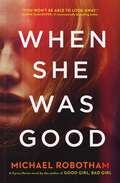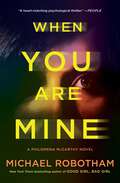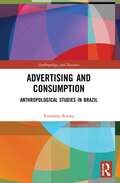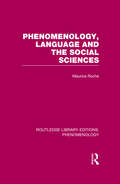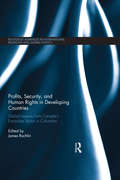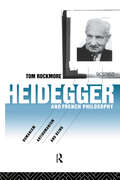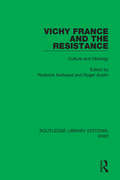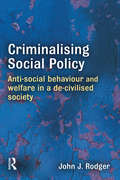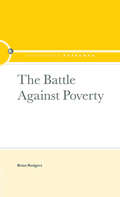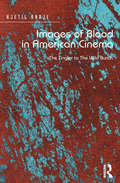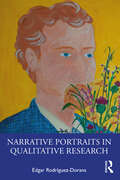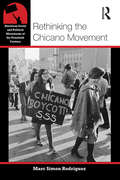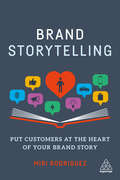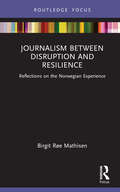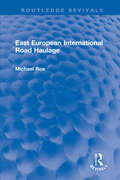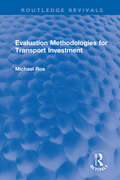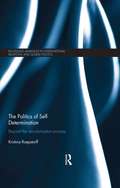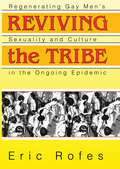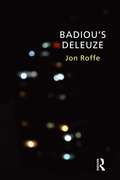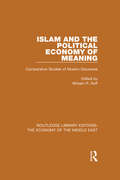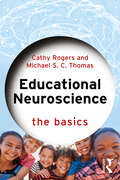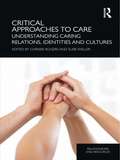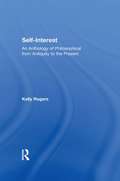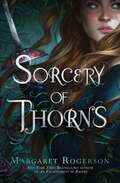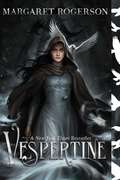Special Collections
Benetech’s Global Certified Accessible Titles
Description: Benetech’s GCA program is the first independent third-party EPUB certification to verify ebook accessibility. By creating content that is born accessible, publishers can meet the needs of all readers. Learn more: https://bornaccessible.benetech.org/
- Table View
- List View
When She Was Good
by Michael RobothamFrom the bestselling author of Good Girl, Bad Girl and When You Are Mine comes a gripping thriller featuring the brilliant forensic psychologist Cyrus Haven as he becomes embroiled in an explosive murder case with disturbing origins.Criminal psychologist Cyrus Haven and Evie Cormac return in this &“powerhouse of a novel&” (Booklist, starred review) from internationally bestselling author Michael Robotham, a writer Stephen King calls &“an absolute master...with heart and soul.&” Who is Evie, the girl with no past, running from? She was discovered hiding in a secret room in the aftermath of a terrible crime. Her ability to tell when someone is lying helped Cyrus crack an impenetrable case in Good Girl, Bad Girl. Now, the closer Cyrus gets to uncovering answers about Evie&’s dark history, the more he exposes Evie to danger, giving her no choice but to run. Ultimately, both will have to decide if some secrets are better left buried and some monsters should never be named...
When You Are Mine
by Michael RobothamFrom an author who Stephen King calls &“an absolute master&” comes a &“heart-clutching psychological thriller&” (People) about a young female police officer facing danger on all fronts—from a clever victim of abuse, skeptical colleagues on the force, and even her own father.Philomena McCarthy is an ambitious police officer with the elite Metropolitan Police in London, responding to a domestic violence call. Tempe Brown is a bloodied young woman and the mistress of a decorated and intimidating London detective, Darren Goodall. Philomena and Tempe strike up a tentative friendship, determined to protect each other from Goodall, but something isn&’t quite right about the stories Tempe tells and the secrets she keeps. Yet the young officer is drawn into Tempe&’s world, unsure of what is real or invented. After a bungled break-in and an unsolved murder, Philomena finds herself trapped—with her career, her impending wedding, and her very survival in doubt. Robotham&’s brilliant ability to render complex characters, both good and bad, keeps readers unsure of whom to trust, &“maintain[ing] an air of excruciating suspense&” (The Washington Post)—until the very last page.
Advertising and Consumption
by Everardo RochaThis book argues for the study of consumption and its relationship with media images, particularly advertising, from a cultural perspective. Focused on Brazil, it draws on decades of research by the author and engages with theory and concepts from a range of classic anthropological works. The chapters examine how advertising professionals view their craft, the resistance to capitalism amongst native Brazilians, images of women and their bodies in magazines, and the case of the first soccer player to become a national media celebrity. Rocha supports the study of consumption as a classification system that materializes culture and creates relations between people and goods. The book presents advertising as a mode of magical thinking that mediates the passage from the machine-driven sphere of production to the humanized sphere of consumption, converting meaningless impersonal things into goods that have name, origin, identity and purpose. It will be of interest to anthropologists, sociologists and others working on advertising, marketing, communications, and consumer research.
Phenomenology, Language and the Social Sciences
by Maurice RocheThis book looks at two ‘revolutions’ in philosophy – phenomenology and conceptual analysis which have been influential in sociology and psychology. It discusses humanistic psychiatry and sociological approaches to the specific area of mental illness, which counter the ultimately reductionist implications of Freudian psycho-analytic theory. The book, originally published in 1973, concludes by stating the broad underlying themes of the two forms of humanistic philosophy and indicating how they relate to the problems of theory and method in sociology.
Profits, Security, and Human Rights in Developing Countries
by James RochlinThe extractive sector is a particular area of expertise for Canada and more than half of Canada’s mining assets abroad are located in Latin America, specifically in Brazil, Peru, Chile, and Colombia. The Canada-Colombia accord was the first free-trade agreement in the world to include annual Human Rights Impact Assessments (HRIA), and also includes a labour side accord where abuse complaints can be formally registered. Using Colombia as a case study, James Rochlin and his international and multidisciplinary line up of Canadian and Colombian scholars, and activists working in the area of human rights, and the judiciary explore: What is the best way to identify and operationalize for mutual benefit the concentric space between the interests of extractive corporations in profit and security, on the one hand, and the interests of the host communities in the promotion of human rights and human security, on the other? What can the four emblematic and diverse cases in Colombia (Meta, Sergovia, Marmato, and Bolivar/La Guajira) tell us about how to fine tune and improve a newly implemented governmental HRIA to render it an increasingly useful global instrument to promote simultaneously corporate security and human security for host communities? What is the most efficient and effective way to design and implement Corporate Social Responsibility Programs in a manner that promotes simultaneously corporate security and community human security? Written in a clear and accessible style, Profits, Security, and Human Rights presents practical lessons on how to promote both corporate security and human security in communities where the extractive sector operates in the Global South.
Heidegger and French Philosophy
by Tom RockmoreMartin Heidegger's impact on contemporary thought is important and controversial. However in France, the influence of this German philosopher is such that contemporary French thought cannot be properly understood without reference to Heidegger and his extraordinary influence. Tom Rockmore examines the reception of Heidegger's thought in France. He argues that in the period after the Second World War, due to the peculiar nature of the humanist French Philosophical tradition, Heidegger became the master thinker of French philosophy. Perhaps most importantly, he contends that this reception - first as philosophical anthropology and later as postmetaphysical humanism - is systematically mistaken.
Vichy France and the Resistance
by Roderick Kedward and Roger AustinThis book, first published in 1985, examines various aspects of the intellectual achievements of writers and artists in the Vichy period; a strong emphasis on the ambiguity of much of their work emerges from the research. It goes a long way in answering the question of what it was like living under the fascist Vichy regime, and what the collaborators and resistance thought about their purpose and patriotism.
Criminalising Social Policy
by John RodgerRecent legislative and policy developments in contemporary Britain have ushered in a new approach to criminal justice. The focus on criminal dispositions and welfarism has given way to a strategy which now involves the management of social exclusion, dysfunctional and anti-social families and situational crime prevention, leading to what has been widely characterized as the 'criminalisation of social policy' - and evidenced most recently by the anti-social behaviour and respect agendas. This book is concerned to explore, analyse and explain these developments. It seeks at the same time to situate the study of anti-social behaviour and response to it in the wider context of changes in the industrial and social structure, social polarization and inequality and the changing role of the welfare state in present-day society. This book will be essential reading for students taking courses in criminology, sociology, criminal justice, social policy and related subjects.
The Battle Against Poverty
by B RodgersFirst Published in 2005. Routledge is an imprint of Taylor & Francis, an informa company.
Images of Blood in American Cinema
by Kjetil RødjeThrough studying images of blood in film from the mid-1950s to the end of the 1960s, this path-breaking book explores how blood as an (audio)visual cinematic element went from predominately operating as a signifier, providing audiences with information about a film’s plot and characters, to increasingly operating in terms of affect, potentially evoking visceral and embodied responses in viewers. Using films such as The Return of Dracula, The Tingler, Blood Feast, Two Thousand Maniacs, Color Me Blood Red, Bonnie and Clyde, and The Wild Bunch, Rødje takes a novel approach to film history by following one (audio)visual element through an exploration that traverses established standards for film production and reception. This study does not heed distinctions regarding to genres (horror, western, gangster) or models of film production (exploitation, independent, studio productions) but rather maps the operations of cinematic images across marginal as well as more traditionally esteemed cinematic territories. The result is a book that rethinks and reassembles cinematic practices as well as aesthetics, and as such invites new ways to investigate how cinematic images enter relations with other images as well as with audiences.
Narrative Portraits in Qualitative Research
by Edgar Rodríguez-DoransNarrative Portraits in Qualitative Research offers an analytical approach to qualitative data. Through narrative portraiture, research findings can be contextualised in broader social narratives without losing sight of the unique personal qualities of the research encounter. Drawing a parallel between the artistic work of a portrait maker in depicting a subject – sometimes an object – and the work of the researcher in exploring people’s experiences, narrative portraiture invites a close-up into a person’s narrated and embodied experience and argues that one of the main research findings in qualitative research is the person themselves; their circumstances, and their life story. The book proposes four approaches to narrative portraiture: (1) a systematic approach to narrative analysis, (2) the use of phronesis in narrative portraiture, (3) the concept of ‘imagined portraits’ as a collaborative approach between visual arts and social sciences, and (4) the use of ‘performative portraits’ both as an analytic tool and product for research communication. This book will help qualitative researchers create first-person narratives that will give a glimpse into the participants’ lives in a way that is simultaneously deep, concise, and evocative. This book will be suitable for those interested in narrative methods and qualitative research in health care, education, and the social sciences.
Rethinking the Chicano Movement
by Marc Simon RodriguezIn the 1960s and 1970s, an energetic new social movement emerged among Mexican Americans. Fighting for civil rights and celebrating a distinct ethnic identity, the Chicano Movement had a lasting impact on the United States, from desegregation to bilingual education. Rethinking the Chicano Movement provides an astute and accessible introduction to this vital grassroots movement. Bringing together different fields of research, this comprehensive yet concise narrative considers the Chicano Movement as a national, not just regional, phenomenon, and places it alongside the other important social movements of the era. Rodriguez details the many different facets of the Chicano movement, including college campuses, third-party politics, media, and art, and traces the development and impact of one of the most important post-WWII social movements in the United States.
Brand Storytelling
by Miri RodriguezDespite understanding essential storytelling techniques, brands continue to explain how their product or service can help the customer, rather than showcasing how the customer's life has changed as a result of them. Brand Storytelling gets back to the heart of brand loyalty, consumer behaviour and engagement as a business strategy: using storytelling to trigger the emotions that humans are driven by. It provides a step by step guide to assess, dismantle and rebuild a brand story, shifting the brand from a 'hero' to 'sidekick' mentality, and positioning the customer as a key influencer to motivate the audience. Written by the award-winning storyteller Miri Rodriguez at Microsoft, Brand Storytelling is a clear, actionable guide that goes beyond content strategy, simplifying where to begin, how to benchmark success and ensuring a consistent brand voice throughout every department. Inspiring with interviews, advice and case studies from leading brands like Expedia, Coca Cola, McDonalds, Adobe and Google, it clarifies why machine-learning, AI and automation only tell one side of the story. Aligning an emotive connection with the customer's personal values, experiences and aspirations will enable brand leaders, employees and influencers to celebrate and strengthen brand engagement for long-term growth, rather than trying to win it.
Journalism Between Disruption and Resilience
by Birgit Røe MathisenFollowing recent developments in digital technologies, financial crises, and changes in audience preferences, this book addresses the critical challenges and disruptions facing the profession of journalism: an arguably precarious industry suffering from employment insecurity, individualization, and loss of autonomy. Drawing on research from the Norwegian and Nordic media landscape, Journalism Between Disruption and Resilience elaborates on how boundary struggles between journalism and other forms of content, such as marketing and public relations, have become blurred, while social distinctions within the profession are deepened and exacerbated by downsizing and cutbacks in newsrooms and their journalistic staffs. The impact of these developments on the institutional and democratic role of journalism in society is discussed alongside the tensions between professional autonomy and precarious work. Expanding upon several earlier research studies, grounded in the sociology of professions and freelance work, this book provides a new theoretical framework from which to addressjournalistic precarity and the role of journalism in society. This is an insightful study for advanced students and researchers in the areas of professional journalism, journalism education, and media industries including marketing and public relations.
East European International Road Haulage
by Michael RoeOriginally published in 1992, this study examines and analyses the role, planning and operation of international road hauliers based in the former East European countries. It outlines the problems they faced and the opportunities the new model of Europe should have provided at the time. It also emphasizes the role that West European hauliers could play in the market and the activities that the European Community carried out in this field in the light of 1992. It concludes by stressing the actions needed in the near future by governments and operators alike. Today it can be read in its historical context.
Evaluation Methodologies for Transport Investment
by Michael RoeOriginally published in 1987, this title reviews and evaluates the methodologies suitable for highway evaluation, along with the UK transport supplementary grant and TPP (Transport Policies and Programme) system. Examples of current UK practice are briefly described, with more details being given of the technique of priority ranking used in the case study area of the West Midlands. Multi criteria approaches are reviewed in chapter two. Chapter three looks at the choice of highway data input in the light of those available, and the practical structure of factorial analysis applied to the case study area. The book covers following issues: computer structure and requirements; highway problem data; referencing methods; site definition; and weighting methods. The results from this study are described and then analysed by classical factorial analysis. The implications of the technique for the TPP preparation process, for the derivation of priorities, and the highway evaluation process as a whole are given. Specific techniques, such as factorial analysis, bridge problem and bus aid ranking, highway capacity calculations and sensitivity testing, as well as the computer programs used (March and COBA) are described in greater detail in the appendices.
The Politics of Self-Determination
by Kristina RoepstorffSince the formation of the UN in 1945 the international community has witnessed a number of violent self-determination conflicts such as the disintegration of Yugoslavia, Chechnya, Kashmir, and South Sudan that have been a major cause of humanitarian crises and destruction. This book examines the scope and applicability of political self-determination beyond the decolonisation process. Explaining the historical evolution of self-determination, this book provides a theoretical examination of the concept and background. Taking an interdisciplinary approach, the author analyses self-determination in relation to contemporary conflicts, which inform and drive a coherent theoretical framework for international responses to claims for self-determination. Built upon an examination of the conceptual foundations of self-determination, this book presents a new understanding and application of self-determination. It addresses the important question of whether self-determination claims legitimate armed violence, either by the self-determining group’s right to rebel, or by the international community in the form of humanitarian intervention. The Politics of Self-Determination will be of interest to students and scholars of political science, international relations, security studies and conflict studies.
Reviving the Tribe
by Eric RofesReviving the Tribe creates a rich and brutally honest portrait of contemporary gay men’s lives amidst the seemingly endless AIDS epidemic and offers both autobiographical self-examination and a relentless critique of current sexual politics within the gay community. Fearlessly confronting the horrors experiences by surviving gay men without giving way to hopelessness, denial, or blame, Reviving the Tribe offers an inspiring blueprint for the gay community which faces a continuing spiral of disaster.In Reviving the Tribe, Author Eric Rofes argues that a return to the interrupted agenda of gay liberation may provide long-term motivation to keep gay men alive and spur rejuvenation of new generations of gay culture. By interweaving social history, psychology, anthropology, epidemiology, sociology, feminist theory, and sexology with his own journey through the epidemic, Rofes provides a moving and compelling argument for stepping out of the “state of emergency” and embracing a life beyond disease. He boldly offers a plan for community regeneration focused on restoring mental health, reclaiming sexuality, and mending the social fabric of communal gay life. Rofes asks unspoken questions lurking in gay men&’s minds and suggests answers to these questions, hitting such controversial topics as: gay men&’s sex cultures of the 1970s why “educated” gay men continue to become HIV-infected changing forms of gay masculinity the opening of new sex clubs and bathhouses leaving “rage activism” behind links between the Holocaust and AIDS unacknowledged roots in the feminist movement of gay men’s AIDS response mass denial of chronic trauma among gay menThe refusal to confront the ever-intensifying manifestations of AIDS has seriously endangered the foundation of contemporary gay communities. Rofes argues that many gay men suffer from the ”disaster syndrome,” a psychologically determined response that defends individuals against being overwhelmed by traumatic experience. In Reviving the Tribe, he provides a radical critique of contemporary gay political culture and suggests alternatives which offer the opportunity to face history, grapple with decimation, and regenerate communal life.Cautioning that an honest analysis of recent gay history and urban cultures promises neither to stop gay men’s suffering nor to end continuing HIV infections, Reviving the Tribe provides gay men with a clear lens through which they might scrutinize their lives, come to a new understanding of the epidemic’s impact on their generation, and redirect activism. This courageous and inspiring work brings Rofes’commanding intellect and twenty years of grassroots gay activism to bear on the challenging task of reconstructing gay life in the new mellennium. Reviving the Tribe is filled with insight of special interest to gay men, lesbians involved in the mixed lesbian/gay movement, sociologists, public health workers, psychologists, counselors, sex educators, religious leaders, and AIDS prevention policymakers searching for fresh vision.
Badiou's Deleuze
by Jon RoffeBadiou's Deleuze presents the first thorough analysis of one of the most significant encounters in contemporary thought: Alain Badiou's summary interpretation and rejection of the philosophy of Gilles Deleuze. Badiou's reading of Deleuze is largely laid out in his provocative book, Deleuze: The Clamor of Being, a highly influential work of considerable power. Badiou's Deleuze presents a detailed examination of Badiou's reading and argues that, whilst it fails to do justice to the Deleuzean project, it invites us to reconsider what Deleuze's philosophy amounts to, to reassess Deleuze's power to address the ultimate concerns of philosophy. Badiou's Deleuze analyses the differing metaphysics of two of the most influential of recent continental philosophers, whose divergent views have helped to shape much contemporary thought.
Islam and the Political Economy of Meaning
by William R. RoffTo be a Muslim is to be a part of a culture with distinct beliefs, ideas, institutional forms and prescriptive roles. Yet there is a complex inter-relationship between a system of knowledge and belief, such as Islam, and the immediate political, economic and social context of its adherents. This book aims to improve understanding of Muslim social and political action by examining a broad spectrum of Muslim discourse, both written and spoken, to see how meaning is formed by context. It is a broad comparative study and examines discourses produced in opposition to government as well as those produced, in Iran or Pakistan for example, under an authoritarian Islamic state. Through cogent analyses of socio-historical contexts and textual materials from East Java, Nigeria, Iran, Pakistan, Indonesia, Malaysia, the Maghreb and Egypt, this book shows how to ‘read’ a familiar Islamic movement, period of change or textual source in a newer and better light. First published in 1987.
Educational Neuroscience
by Michael S. Thomas and Cathy RogersEducational Neuroscience: The Basics is an engaging introduction to this emerging, interdisciplinary field. It explains how the brain works and its priorities for learning, and shows how educational neuroscience, when combined with existing knowledge of human and social psychology, and with teacher expertise, can improve outcomes for students. Cathy Rogers and Michael S. C. Thomas reveal how neuroscientific evidence is forcing us to question our assumptions about how our brains learn and what this means for education. The chapters in this vital volume step through the brain’s priorities: processing senses and moving our bodies, emotional processing, and the difficult job of dealing with other people. It unpacks the tricky tasks of thinking and learning, considering how memory works and the many systems involved in learning. It draws this all together to offer guidance for effective classroom practice, current and future. Chapter features include key issues for special educational needs and neurodiversity, case studies of novel interventions, debunking of common neuromyths, and guidance for teachers on how to evaluate their own practice. This book is a compact, lively introductory text for students of psychology, neuroscience and education and courses where these disciplines interconnect. It will also be essential reading for educational professionals, including teachers, heads, educational advisors and the many industry bodies who govern and train them, as well as anyone interested in the fascinating story of how we learn.
Critical Approaches to Care
by Chrissie Rogers and Susie WellerWhat does ‘care’ mean in contemporary society? How are caring relationships practised in different contexts? What resources do individuals and collectives draw upon in order to care for, care with and care about themselves and others? How do such relationships and practices relate to broader social processes? Care shapes people’s everyday lives and relationships and caring relations and practices influence the economies of different societies. This interdisciplinary book takes a nuanced and context-sensitive approach to exploring caring relationships, identities and practices within and across a variety of cultural, familial, geographical and institutional arenas. Grounded in rich empirical research and discussing key theoretical, policy and practice debates, it provides important, yet often neglected, international and cross-cultural perspectives. It is divided into four sections covering: caring within educational institutions; caring amongst communities and networks; caring and families; and caring across the life-course. Contributing to broader theoretical, philosophical and moral debates associated with the ethics of care, citizenship, justice, relationality and entanglements of power, Critical Approaches to Care is an important work for students and academics studying caring and care work in the fields of health and social care, sociology, social policy, anthropology, education, human geography and politics.
Self-Interest
by Kelly RogersSelf-Interest discusses the reconciliation of inevitable self-concern with its manifest potential for harm. This anthology brings together the efforts of twenty three renown philosophers to address the matter of how to bring about such a reconciliation. The drive for self-preservation, as observed by Aquinas, is the first law of nature. With this self-love, however, comes the threat of "the excessive love of self". Self-Interest brings into discussion the reconciliation of necessary self-concern with its manifest potential for harm. This anthology brings together the work of twenty-three important philosophers to address the question of how to bring about such a reconciliation. Contributors include: Democritus, Plato, Aristotle, Augustine of Hippo, Aquinas,Hobbes, Nicole, Mandeville, Butler, Hutchenson, Hume, Smith, Kant, Bentham, Mill, James, Nietzsche, Dewey, Rand, and Gauthier.
Sorcery of Thorns
by Margaret RogersonA New York Times bestseller! &“A bewitching gem...I absolutely loved every moment of this story.&” —Stephanie Garber, #1 New York Times bestselling author of the Caraval series &“If you loved the Hogwarts Library…you&’ll be right at home at Summershall.&” —Katherine Arden, New York Times bestselling author of The Bear and the Nightingale From the New York Times bestselling author of An Enchantment of Ravens comes an &“enthralling adventure&” (Kirkus Reviews, starred review) about an apprentice at a magical library who must battle a powerful sorcerer to save her kingdom.All sorcerers are evil. Elisabeth has known that as long as she has known anything. Raised as a foundling in one of Austermeer&’s Great Libraries, Elisabeth has grown up among the tools of sorcery—magical grimoires that whisper on shelves and rattle beneath iron chains. If provoked, they transform into grotesque monsters of ink and leather. Then an act of sabotage releases the library&’s most dangerous grimoire, and Elisabeth is implicated in the crime. With no one to turn to but her sworn enemy, the sorcerer Nathaniel Thorn, and his mysterious demonic servant, she finds herself entangled in a centuries-old conspiracy. Not only could the Great Libraries go up in flames, but the world along with them. As her alliance with Nathaniel grows stronger, Elisabeth starts to question everything she&’s been taught—about sorcerers, about the libraries she loves, even about herself. For Elisabeth has a power she has never guessed, and a future she could never have imagined.
Vespertine
by Margaret RogersonFrom the New York Times bestselling author of Sorcery of Thorns and An Enchantment of Ravens comes a thrilling new YA fantasy about a teen girl with mythic abilities who must defend her world against restless spirits of the dead.
The dead of Loraille do not rest. Artemisia is training to be a Gray Sister, a nun who cleanses the bodies of the deceased so that their souls can pass on; otherwise, they will rise as spirits with a ravenous hunger for the living. She would rather deal with the dead than the living, who trade whispers about her scarred hands and troubled past. When her convent is attacked by possessed soldiers, Artemisia defends it by awakening an ancient spirit bound to a saint’s relic. It is a revenant, a malevolent being that threatens to possess her the moment she drops her guard. Wielding its extraordinary power almost consumes her—but death has come to Loraille, and only a vespertine, a priestess trained to wield a high relic, has any chance of stopping it.
With all knowledge of vespertines lost to time, Artemisia turns to the last remaining expert for help: the revenant itself. As she unravels a sinister mystery of saints, secrets, and dark magic, her bond with the revenant grows. And when a hidden evil begins to surface, she discovers that facing this enemy might require her to betray everything she has been taught to believe—if the revenant doesn’t betray her first.
